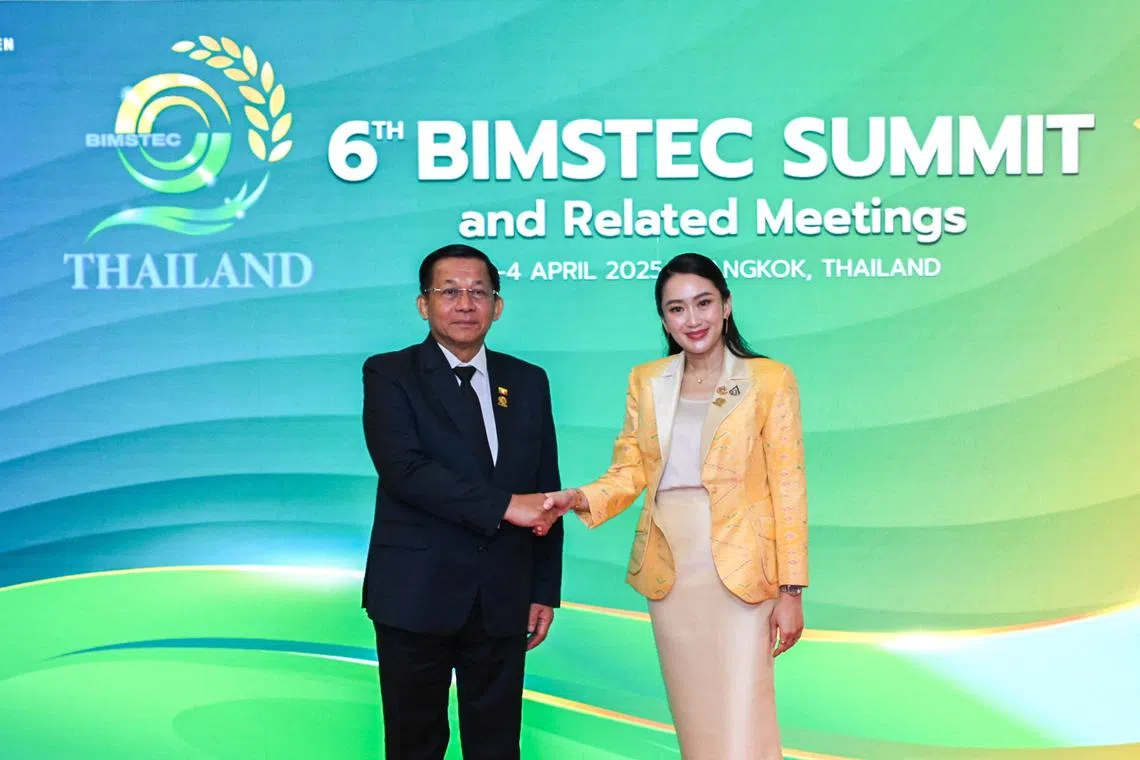Myanmar junta chief meets foreign leaders, UN says military choking aid
Sign up now: Get insights on Asia's fast-moving developments

Myanmar's junta leader Min Aung Hlaing with Thailand's Premier Paetongtarn Shinawatra at the Bimstec summit in Bangkok on April 4.
PHOTO: REUTERS
Follow topic:
BANGKOK – Myanmar’s ostracised junta chief met the leaders of India and Thailand during a regional summit in Bangkok on April 4, as the UN said that his military was limiting humanitarian aid following the earthquake that killed more than 3,100 people
The rare foreign trip by Senior General Min Aung Hlaing, shunned by most world leaders since leading a 2021 coup that overthrew an elected government and ignited nationwide conflict, exploits a window that has been opened by the earthquake to ramp up diplomacy.
On the sidelines of the Bimstec summit, Gen Min Aung Hlaing had two-way meetings with Thai Premier Paetongtarn Shinawatra and Indian Prime Minister Narendra Modi, with recovery from the quake a common topic.
The Bimstec – or Bay of Bengal Initiative for Multi-Sectoral Technical and Economic Cooperation – grouping also includes Bangladesh, Sri Lanka and Bhutan.
With a protracted civil war ravaging Myanmar since the coup, Mr Modi called for a post-earthquake ceasefire in the country of 55 million people to be made permanent, an Indian Foreign Ministry spokesman said.
“Political resolution to the conflict is the only way forward, starting with inclusive and credible elections,” spokesman Randhir Jaiswal said in a post on X.
Myanmar’s junta announced a temporary ceasefire from April 2 to 22 in operations against armed opponents, mirroring moves by a rebel alliance and a shadow government that includes parts of the previous administration.
The UN Office of the High Commissioner for Human Rights said the junta was restricting aid supplies to quake-hit areas where local communities did not back its rule.
It also said it was investigating 53 reported attacks by the junta, including air strikes, against opponents, 16 of which came after a ceasefire on April 2.
A junta spokesman did not respond to calls from Reuters seeking comment.
The death toll from the March 28 earthquake of 7.7 magnitude climbed to 3,145, with more than 4,500 injured and more than 200 missing, the junta said.
Referring to civil strife unleashed by the coup, UN Secretary-General Antonio Guterres told reporters on April 3: “The earthquake has supercharged the suffering, with the monsoon season just around the corner.
“I appeal for every effort to transform this tragic moment into an opportunity for the people of Myanmar.”
United Nations aid chief Tom Fletcher was set to arrive
Myanmar’s neighbours, such as China, India and South-east Asian nations, are among the countries that dispatched relief supplies and rescuers to aid the recovery effort in quake-hit areas that are home to about 28 million people.
Extreme heat and forecast heavy rain could cause disease outbreaks among earthquake survivors camping in the open as the risk of cholera grows in such areas, namely Mandalay, Sagaing and the capital of Naypyitaw.
Even before the quake, millions had suffered in Myanmar’s widening civil war, triggered by the coup that ousted the government of Nobel peace laureate Aung San Suu Kyi.
It has decimated the mainly agrarian economy, driven more than 3.5 million people from their homes and crippled essential services such as healthcare.
Thailand’s Foreign Ministry said the Thai and Malaysian foreign ministers would visit Myanmar on April 5.
At the Bimstec summit, Thai Premier Paetongtarn urged the group to forge a free trade agreement and to cooperate on constructing a highway connecting Thailand, Myanmar and India, the Thai government said.
Before the quake, Myanmar’s junta had been pushing ahead with a plan to hold a general election in December, though critics have derided this as a sham intended to keep the generals in power through proxies.
“Min Aung Hlaing’s recent state visits to China and Russia have created new incentives for India to dial up its own engagement,” Singapore-based analyst Angshuman Choudhury said.
“Moreover, under Modi, India has pitched itself as a humanitarian first responder in the region – so post-earthquake disaster relief becomes an easy pivot for a direct meeting.” REUTERS

